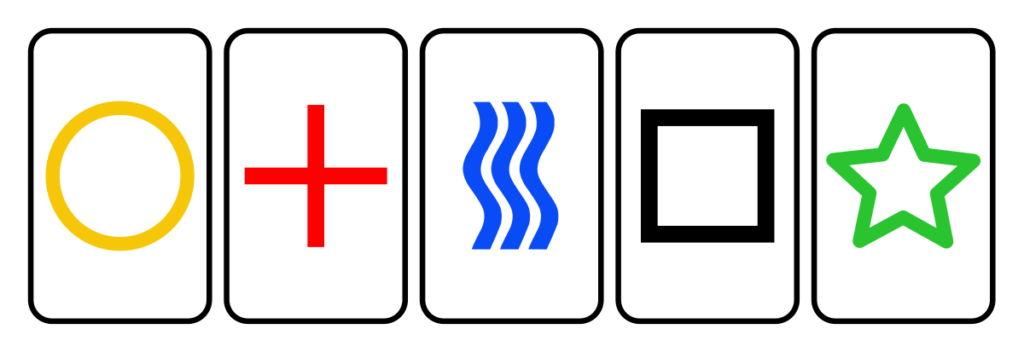
“Well, if you can see into the future, why haven’t you won the lottery?” Gosh, if only it worked like that. Imagine a world where psychic ability was an on-demand, accurate and clear sense: we’d all be millionaires and never make mistakes! That being said, precognition is all about seeing possible futures. J.B. Rhine tried to study precognition using the famous Zener cards. The test subject would write down what order the cards would eventually be in once the tester shuffled the deck. Then the tester would shuffle the deck and turn the cards over from the top of the deck comparing them to the predicted order of the cards. If the test subject guessed correctly higher than statistical average through a series of runs, they would be considered a Precog. As with telepathy, there are levels of ability and accuracy depending on how skilled the Precog is.
What are Zener Cards?
When J.B. Rhine was developing the precognitive card test, he was originally using playing cards. Magicians have long known how to identify playing cards and so did some of the test subjects. As a result, J.B. created the Zener card deck which has five of each geometrical shape. Some decks also have the shapes colored to include one more possible variable. This prevented most of the cheating that had occurred with playing cards.
For practical purposes, precognition is not as reliable the more complex the vision gets. If the outcome is between a set of cards or a number on the roulette wheel, it’s quite simple to see the statistical differences between a control group and a Precog group. When testers are asked to evaluate the precognitive outcome of a complex dream or vision, there are many more variables to consider. There is also the issue of interpreting symbolic visions. This is where the research gets somewhat muddy.
Is it Precognition or is it Coincidence?
When a person has a vivid dream or a vivid waking vision where something happens, say a car accident, they may see it as clearly as if it’s already happened. When a car accident does occur, did they predict the actual event? Given the prevalence of people either driving or being passengers in cars on a daily basis, the chances of this event being precognitively determined go down as the details between the vision and the actual event differ. For instance, let’s say the accident seen in the vivid dream had a car being hit by a truck as it entered the intersection of Smith and Park streets. The truck had an ice cream logo on its side. The next day the event actually occurs. The car was struck, not by a truck, but by another car in the intersection of West 76th and Humbolt. Perhaps the Precog could be given some credit for having foreseen that a car was involved in an accident with that particular group of passengers and driver, but would not be given credit for anything else. The vision could be relegated to coincidence. We may imagine a car accident involving our loved ones many times over a period of years. That one time it does happen, we may assume it’s due to a special precognitive ability rather than the more likely coincidence.
One other issue with interpreting precognitive events is the witness effect. People are notoriously unreliable witnesses because of how we save and re-evaluate memories. When an event occurs, we may change some of the details from the memories of our visions to match the actual event rather than to compare and contrast them objectively. That is why it is important to write down the visions or dreams immediately after they occur and with as much detail as we can remember. This way, we can objectively evaluate the differences between the vision and actual event.
One way we could test for precognitive events is to create a searchable database where written accounts of vivid dreams or waking visions may be stored. If people have these visions and their experiences are logged prior to a related event, the scientist may evaluate and compare the written visual to the actual event for accuracy. This may help the experiencer see if they were actually having a precognitive event or if it was just a coincidence.
Some Parapsychologists claim that all telepathy is actually precognition. Given that much of psychic ability is not time relative, this is a valid argument. Instead of reading information from a person in real time, maybe the telepath is actually gleaning information from the future when they’ve had a conversation with the target of interest. Perhaps precognition is simply future telepathy. In the vast world of Parapsychology, anything is possible.
